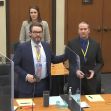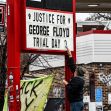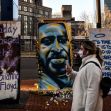George Floyd took his last breath while pinned to the ground beneath a Minneapolis police officer’s knee. Millions of people watched. Tens of thousands have protested the killing of Black men like Floyd, chanting some of Floyd’s final words, “I can’t breathe.” Now lawyers must find 12-16 people in and around Minneapolis who haven’t already formed an opinion about what happened that day.
On Tuesday, March 9, 2021, the challenging task of seating a jury in the George Floyd death trial began. Despite petitions to delay the hearing and still incomplete appeals about additional murder charges, the defense and prosecution attorneys began.
Ben Crump, the Floyd family attorney, said, “Jury selection is going to be very long.” He believes “You can get people who will commit to be honest, and that’s all you can ever ask for.”
Susan Gaertner, a former top prosecutor in St. Paul, said, “I think it’s going to be extremely difficult to pick a jury. There have been few incidents in our state that have had as much impact on the community. It’s hard to imagine finding a juror who is enough of a blank slate to really give both sides a fair hearing.”
The potential jurors in the case were sent a 13-page questionnaire months ahead of time. It contained questions about media habits, opinions on the criminal justice system, police contacts, whether they struggled with drug addiction, and came complete with this warning: “From this day forward, DO NOT read or intentionally view anything about these cases or do any investigation or research related to these cases.”
Other questions asked whether they or others close to them participated in any marches or demonstrations regarding police brutality, whether they or someone they know was injured or suffered damage during the protests. In bold was written: “No matter what you have heard or seen about this case, and no matter what opinions you might have formed, can you put all of that aside and decide this case only on the evidence you receive in court, follow the law, and decide the case in a fair and impartial manner?”
The questionnaires were intended to help lawyers discover ideological leanings and create more depth of understanding regarding how the jurors think. The prosecution will likely favor highly educated young liberals, while the defense will likely be looking for conservatives who approve of law enforcement.
On Monday, 16 people were struck from the pool because of their answers to the questionnaire.
The people in the jury pool were brought one by one into the courtroom and sworn in by the judge. After hours of questioning, slow and at times intense, three jurors had been chosen. Six other candidates were dismissed. Nearly all of those questioned admitted to “very negative views” about Derek Chauvin, the former police officer charged with second-degree murder and manslaughter in Floyd’s May 2020 death.
Among the questions the attorneys repeatedly asked were how many times they had seen the video of Floyd’s death, what interactions they’d had with law enforcement, and what interactions they’d had with the Minneapolis Police Department. They were asked about their opinions of the Black Lives Matter and Blue Lives Matter movements.
The first juror chosen was a White man from Minneapolis, a chemist for an environmental testing agency who seems to be about 30 years old. He denied having seen the footage of Chauvin kneeling on Floyd’s neck. His admission prompted courtroom reaction, as the suspicion was that nearly everyone summoned had significant knowledge of the death of Floyd. His death has been a catalyst in national discussions of race, policing, and social justice.
The juror, called Juror No. 2, said “There’s a still image that’s pretty common, that’s the most I’ve seen.” He explained that his background in science would allow him to be an impartial and fair juror and that the media coverage of Floyd’s death had not informed his opinions on the case. He said, “I consider myself a pretty logical person.” He will base his judgment on facts and logic, he said, not opinions. He said he has worked as a summer camp counselor through his synagogue, resolving disputes among campers. He goes backpacking several times each year and plays Ultimate Frisbee. He also said, “I support the message that every life should matter equally. I think all lives matter equally,” when asked about the Black Lives Matter and Blue Lives Matter movements.
Juror No. 9 was the second juror seated. The woman, who appeared to be of mixed race, told the court she grew up in Northern Minnesota and had an uncle in law enforcement. She said she was “excited” to be summoned in the case, and that her uncle’s work would not impact her ability to be fair. “(This) is a very important case not just for Hennepin County, but nationwide. A lot of people feel very strongly about it,” she said. “It’s just something that everyone’s heard about, everyone’s talked about and everyone is going to hear about even long after the trial is over, no matter the decision.”
Juror No. 9 had seen the video and said she had a negative view of Chauvin. “That’s the only thing I have ever seen of this person,” she said of the video. “Nobody wants to see someone dying.” She told the court that her mind was open to any evidence that might be presented in Chauvin’s favor.
Another White man, Juror No. 19, was seated third. He is a corporate auditor. He admitted to a negative view of Chauvin, saying, “The fact is someone died and that is not a positive thing.” Juror No. 19 said that Floyd deserved “justice,” but stated he had not made up his mind about Chauvin’s guilt or innocence.
Three of the six dismissed jurors were people of color. One of those was a 19-year old Black man who admitted to being suspicious of law enforcement and claimed he did not want to be part of a “divisive case.”
The defense exercised two of its 15 challenges to dismiss potential jurors of Hispanic descent. One, a nursing assistant, was a married mother of three from Mexico. She told the judge she had used Google Translate to help her complete the juror questionnaire and had concerns about a language barrier. Chauvin’s attorney, Eric Nelson, questioned her impartiality: on her form she had written, “I would like to give my opinion on the unjust death of Mr. Floyd.”
The other defense peremptory challenge was used to disqualify a Latino man who practices jiujitsu and muay thai, both martial arts.
Former federal prosecutor Miriam Krinsky, head of the nonprofit Fair and Just Prosecution, said that the search is for a jury that is willing to be fair, not one that knows nothing about the case. She noted that often questions for the potential jurors are a cover for race-based decisions, with questions about bad experiences with law enforcement that “too often lead to eliminating jurors of color in over-policed communities.”
The judge is supposed to strike any potential jurors who can’t set aside their preconceptions. The prosecution may strike nine potential jurors.
There is concern about the racial makeup of the jury. Hennepin County, Minneapolis’s location, is mostly white (80%, and 8% Black), and so have its juries been. Jurors must take time off work for the duration of the trial, which is likely to be four weeks. Their employers are not required to pay them, and jurors get $20 per day plus mileage. Additionally, the pandemic has been disproportionally difficult for the Black community. Sarah Davis, executive director of the nonprofit Legal Rights Center in Minneapolis, said, “I think the likelihood of having a racially diverse jury is slim to none. We have to go into it just knowing that that’s the case. And I think each side is looking for jurors that are going to be more inclined to side with them.”
Joseph Daly, emeritus professor at Mitchell Hamline School of Law, said that the lawyers will use their time to do more than unearth biases in the potential jurors. They can also use the jury selection process to educate, make a connection with the jurors, and also ingratiate themselves with them. Daly said he has sometimes chosen a juror based on the “infamous presidential candidate test” - whether he’d have a beer with that person. If he would, he can connect with the juror.
Criminal defense lawyer Benjamin Brafman of New York City has no connection to this case. He suggested that lawyers subtly challenge potential jurors. They could be asked, “Do you have the courage to acquit if you feel an acquittal is required under the law? Do you feel you can go back into your community, your neighborhood, your family if you’ve made a decision that might not be popular?” Brafman said that “You want to get at what they’re thinking,” and suggested using open-ended questions, then following up.
Paul Butler, a former prosecutor and professor at Georgetown Law, said, “The conventional wisdom has been that jurors generally, and white jurors in particular, think that even if the officer made a mistake, he or she was just trying to do their job — they’re reluctant to punish.”
The task is to impanel 12 jurors and up to four alternates. The trial is viewed as a landmark and a potential indicator of change in the way police officers, previously rarely punished for abusive behavior and fatal tactics on the job, may be allowed to function going forward. Defense attorneys argued that it’s impossible to have a fair trial in Minneapolis because of the vast media coverage of the case and strong community emotions around policing. Their attempts to change venue have been denied up to this point.
Jury selection continued on Wednesday.
Floyd’s uncle, Selwyn Jones, is rooting for a conviction. But he said, “If we don’t get the outcome we want, I’m going to chalk it up to being a black man in America.”






